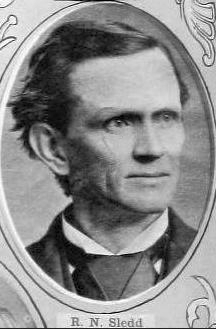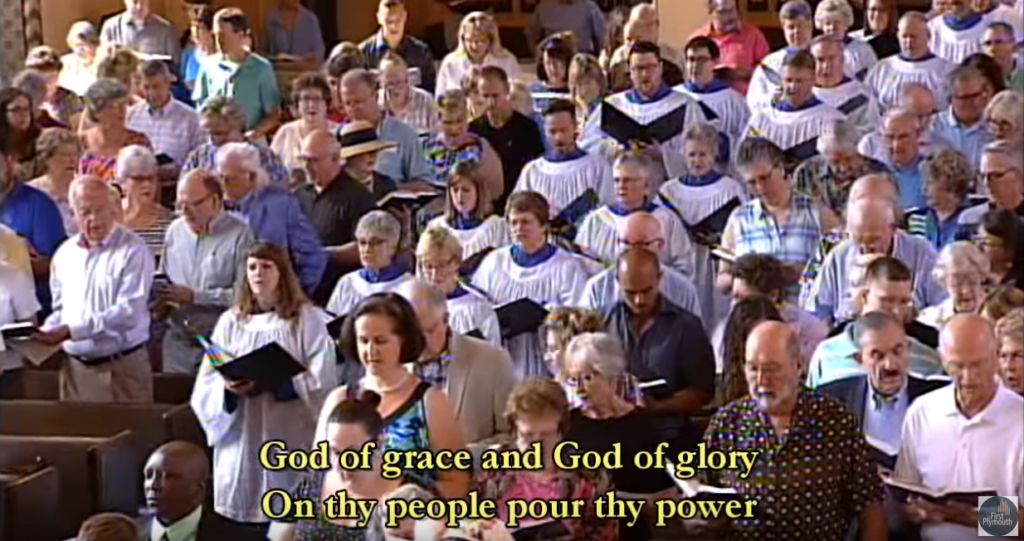Editor’s note: The following is extracted from True Heroism and Other Sermons, by R. N. Sledd (published 1899).
“The Spirit itself beareth witness with our spirit, that we are the children of God.” — Romans viii, 16.
Is it possible for a man to know that his sins have been forgiven, or to have such an assurance of it as will give him rest and satisfaction of soul in relation to his personal salvation? This question we propose for a brief examination. Surely it is one in which every thoughtful person must feel a lively interest. Few subjects are of more vital importance. It is directly connected with and deeply affects our religious life and experience. It is entitled to careful study.
If such knowledge be attainable it must be the result of a supernatural communication to the soul. The forgiveness of sin is God’s act. Our natural powers may, by certain simple processes, enable us to infer that such an act has taken place. But it is only an inference, nothing more. If it be known as a certainty, or a fact that no longer admits of doubt or debate, God must in some way make it known.
1. It is certainly possible for Him to do so. We are the workmanship of His hands. Our intellectual and moral nature, as well as our body, is the creation of His wisdom and power. It lives and moves and has its being in Him. To every part of this wonderful mechanism He has constant access, and with every part He is in constant contact. He can make upon it any impression or make to it any communication that His wisdom and love may suggest. To deny such a possibility is to deny His prerogative as the soul’s Creator, and to call in question many declarations of His word.
2. It is in a high degree probable that when God pardons a sinner He will in some way make the fact known. For a crime against the laws of his country a man is sentenced to imprisonment for life. For satisfactory reasons the Executive pardons him. The pardon is executed in due form, signed and sealed. What now? Will it be locked up as a state secret, never to be known beyond the Governor’s office? or will it be transmitted to the convict, set him at liberty, and restore him to the duties and endearments of his home? A son has incurred the just displeasure of his father, and has been banished from his home. He wakes up to a realization of the evil of his course. He is filled with sorrow: he repents, and writes to his father confessing his sin, promising amendment, and begging forgiveness. The father is convinced of the genuineness of his repentance, and with all his heart forgives him. What now? Does he conceal the fact in his own bosom, or confine it to the home circle, or does he communicate it to his repentant child and recall him to his home? A sinner comes with a broken and contrite heart to God for pardon and salvation. He comes with the warrant of a divine invitation, and a divine pledge of success. God is “faithful and just to forgive him his sins and to cleanse him from all unrighteousness.” If it be not probable that the Executive will withhold the pardon from the convict, or the father keep the son in ignorance of forgiveness, so neither is it probable that God will conceal from the weeping penitent the gracious act that cancels his guilt and gives him a place in the divine family. He cannot be less gracious than an earthly ruler, or an earthly father.
3. It is necessary that the fact of pardon should be made known to the soul. It is not a pardon if the convict must still wear his chains and languish in his cell. It is the merest mockery of fatherly goodness if the son must still wander and suffer in exile. To be forgiveness in any true sense it must be operative; it must bring liberty, restoration and comfort. The Saviour invites all that labor and are heavy laden to come to Him, and promises that they shall find rest unto their souls and shall be free indeed. But there can be no rest, no freedom, no peace, so long as the soul has no assurance of its forgiveness and acceptance with God. It must know it, or the word of God will be discredited by the experience of men; the hopes which it inspires, and the peace, joy, strength and triumph which it promises cannot be come matters of fact in the Christian life.
4. It is certain that God will make known to the penitent, believing soul the fact of forgiveness. To impart this knowledge entered into the plan and purpose of God when He sent His Son into the world. “When the fulness of time was come, God sent forth His Son, made of a woman, made under the law, to redeem them that were under the law, that we might receive the adoption of sons; and because ye are sons, God hath sent forth the Spirit of His Son into your hearts, whereby we cry Abba, Father.” The adoption of sons, and with it all the privileges of sonship, thus entered into the original conception of redemption. The work of Christ in its application to the soul fails of its aim if it falls short of this grace.
But we have more than abstract declarations and promises with respect to the fruits of penitence and faith; we have illustrations in the lives of the saints, glorious demonstrations of the truth we are considering. “By faith Abel offered unto God a more excellent sacrifice than Cain, by which he obtained witness that he was righteous, God testifying of his gifts.” “By faith Enoch was translated that he should not see death; and was not found, because God had translated him; but before his translation he had this testimony, that he pleased God.” Abraham is called “the friend of God;” and beyond question he knew that God was his friend. He would never have gone so willingly he knew not whither and dwelt so cheerfully as a stranger and pilgrim in the promised land, or given to the world such a magnificent exhibition of the obedience of faith in surrendering his son to the altar of sacrifice, had he not known beyond peradventure that God was with him in the plentitude of His resources and the fulness of his love. Job could say, “I know that my Redeemer liveth.” David prayed, “Restore unto me the joy of Thy salvation” — a prayer without meaning if David had not previously known what the joy of salvation is. We need not further multiply examples. The Old Testament abounds with proofs that even amid the shadows of that dispensation the servants of God rejoiced in the assurance of His favor and love. But that dispensation was as the early dawn to the noonday when compared with the day of Christ and the ministration of the Spirit. And if the saints enjoyed this gracious privilege then, for a much stronger reason may we expect to enjoy it now. Accordingly we find that not apostles and a favored few only, but multitudes in all ages of the church have rejoiced in this happy experience. “Ye are My witnesses,” said the Master; Yes, gracious Lord, and we gladly speak the things we do know and testify that we have seen. We know that Thou hast power on earth to forgive sins; for though Thou wast angry with us, Thine anger is turned away and Thou comfortest us.
If it be asked how God makes this communication to the soul, we refer the inquirer to the text for a reply: “The Spirit itself beareth witness with our spirit that we are the children of God.” Here are two witnesses. Their concurrent testimony is all-sufficient to establish the fact of our adoption.
I. The testimony of the Holy Spirit. No one will question His competency as a witness except those who deny His personality. If the Scriptures mean by the Spirit nothing more than an attribute of God or an influence emanating from Him, then the claim that He is a witness is untenable. An attribute or influence cannot testify to anything. But we hold that it is as easy to demonstrate the impersonality of the Father, or of the Son, as of the Spirit. The attributes, works and glory of the Father and the Son are ascribed in the word equally and in the same sense to the Spirit. His offices in the economy of redemption are predicable only of a Person. Our fourth Article of Religion makes him co-equal with the Father and the Son — “of one substance, majesty, and glory, with the Father and the Son, very and eternal God.” His personality and divinity admitted, His perfect cognizance of the thoughts, purposes, and acts of the Eternal Father follows as a necessary consequence. Hence we read, “The Spirit searcheth all things, yea, the deep things of God;” again, “The things of God knoweth no man, but the Spirit of God.” His absolute knowledge of every movement of the Divine will, settles beyond dispute the question of His competency to bear witness to any act of the divine administration. Unless now the objector can show that man is not a spiritual being, and therefore is incapable of receiving spiritual impressions and communications, which we are very sure he will not affirm, the conclusion follows that the Spirit can impart and man can receive the assurance of the forgiveness of sins.
What is the nature of the Spirit’s testimony? We know no better reply to this inquiry than that of Mr. Wesley. He rescued this doctrine from the obscurity and discredit into which it had fallen, and by its proclamation in “demonstration of the Spirit and of power,” as much as by the preaching of any other truth of the word, became the instrument of that gracious awakening and revival of vital godliness of the results of which all the churches have partaken so largely. He says:
“It is hard to find words in the language of men to explain the deep things of God. Indeed there are none that will adequately express what the Spirit of God works in His children. But perhaps one might say (desiring any who are taught of God to correct, soften, or strengthen the expression), by the testimony of the Spirit, I mean, an inward impression on the soul, whereby the Spirit of God immediately and directly witnesses to my spirit that I am a child of God; that Jesus hath loved me and given Himself for me; that all my sins are blotted out, and I, even I, am reconciled to God.”
“After twenty years farther consideration,” he says, “I see no cause to retract any part of this. Neither do I conceive how any of these expressions may be altered, so as to make thsm more intelligible.”
This is all profoundly mysterious to the natural man. He “discerneth not the things of the Spirit of God; for they are foolishness to him; neither can he know them because they are spiritually discerned.” But the man who has been justified from all his offences and regenerated by the Holy Ghost can enter unto the spirit and meaning of this definition. He knows what that “impression on the soul” is. He sees in this language, as in a mirror, the reflection of his own happy experience. He does not ask that a single expression be altered. The study of a lifetime could not make it more intelligible to him.
But may not impressions resulting from purely natural causes be confounded with the witness of the Spirit? May not the one be mistaken for the other, and the soul thus involve itself in a ruinous self-deception? Yes; men have mistaken that feeling of quiet satisfaction that often arises from an earnest effort to serve and please God, or that reaction and sense of repose that often follows the violent agitations of the moral feelings, or the crude fancies of a heated imagination, for this divine testimony. From such mistakes have come many of those religious vagaries, and much of that intolerance and mad fanaticism that have given birth to so many evils to our race. In many such cases the delusion vanishes as soon as the exciting cause ceases to operate. Where it is more permanent, its true character will appear in its fruits.
But the converse of this admission is not true. A man may deceive himself; but the Spirit of truth will not deceive him. He may mistake something else for the witness of the Spirit; but he will not mistake the witness of the Spirit for something else. It is inconceivable that, coming on this very errand, coming to make known to the soul the joyful fact of its deliverance and salvation, the Holy Ghost should do His work so imperfectly as to leave the soul in doubt whether it was He, or excited emotion, or the devil, that wrought in it that sweet impression which it experienced. He will accompany his testimony with such tokens as will leave no reasonable ground of confusion or doubt. He will not do less than teach the babe in Christ to say, Abba, Father, and assure him that he is born of God.
This testimony of the Spirit is the concomitant of regeneration. It cannot precede regeneration; for it is only in regeneration that a man becomes a child of God. Nor can it be deferred to some indefinite time after regeneration. The comparison of spiritual with natural infancy fails at this point. The babe will not recognize its father as such for months; nor will it perceive at once any difference between its mother and any other woman who may give it needed nourishment and loving care. But those who are born into the family of God, through the Spirit’s gracious office, come at once to know the blessed fact. “The love of the Spirit” will not permit delay. “Did ye receive the Holy Ghost when ye believed?” was Paul’s inquiry of John’s disciples at Ephesus. The question indicates Paul’s view of the matter. Evidently he believed that the faith that saves is accompanied by the grace of the Spirit that renews, comforts, and assures. Leave this grace out of conversion and what remains? Merely the semblance, the outward show, the shadow of conversion; a transaction that may reform the life, but leave the heart untouched, as full as ever of the roots of bitterness, and as destitute as ever of the joy of salvation. Expect the Spirit’s testimony in the hour, the moment, of regeneration.
But to fortify us against the danger of self-deception and the extravagances of fanaticism on the one hand, and the distractions and oppressions of doubt on the other, there is a second witness. “The Spirit itself beareth witness with” — that is along with, conjointly with — “our spirit that we are the children of God.”
II. The testimony of our spirit. By our own spirit we understand that subtle power within us that not only thinks, feels, wills, but takes cognizance of its own operations and experiences. “What man knoweth the things of man, but the spirit of a man which is in him?” All others are of necessity ignorant of what takes place in the inner depths of our being; but we are not, and cannot be ignorant; we know that we think and know what we think; that we feel, and what we feel; and no change can take place in our moral feelings of which we are not immediately and irresistibly conscious. When a man is justified and regenerated he knows that some change has been wrought in his soul. The nature and import of the change he may not understand; but he can no more doubt the fact than he can call in question any other fact of consciousness. The ever vigilant adversary suggests doubts and awakens fears. “That which you feel was the work of excited emotion. You cried Abba, Father, too quickly. Conversion is something very different from anything you have experienced.” It is not to be wondered at that such suggestions find lodgment, and greatly trouble his sensitive soul. But he need not long be in doubt. The means are at hand whereby he can soon identify his experience as a work of the Spirit if it be such. He has only to compare that experience with the word of God. Error, delusion, vain imaginations, are all unmasked when brought to this infallible touchstone. When he appeals to its tests of a saved state, his consciousness will enable him to decide whether there be agreement or disagreement between these tests and what he finds in his own heart; in other words, whether he be saved or still in his sins.
When Paul says, “Being justified by faith we have peace with God through our Lord Jesus,” he states a fact of universal Christian experience. The awakened sinner has no peace — no peace within, no peace with God. On the contrary he has a distressing sense of his estrangement from God, of God’s righteous displeasure, and, as a consequence, a fearful looking for of judgment and fiery indignation. But, strange to tell, in the moment of the soul’s greatest anguish and deepest gloom by some mysterious working there is a complete revolution within. Instead of alienation there is friendship; love has taken the place of fear, and hope the place of despair. The tumult of the soul has subsided into a blessed calm. There is quietness within, and he looks up into the face of God and says, “My Father.” He cannot help being conscious of this change, and rightly infers from it that he is “justified by faith.”
Paul says again, “There is, therefore, now no condemnation to them which are in Christ Jesus, who walk not after the flesh but after the Spirit. For the law of the Spirit of life in Christ Jesus hath made me free from the law of sin and death.” Every man while living in sin is in a state of condemnation. For “he that believeth not is condemned already.” Under the quickening power of the Holy Ghost this condemnation becomes a fact of consciousness. He feels that he is condemned by that law which is “holy, just, and good,” and that if God were to enter into judgment with him, he must suffer “the vengeance of eternal fire.” This sense of condemnation becomes a grievous burden to him. It bows his head; oppresses his soul; destroys his relish for all earthly joys and all worldly pursuits. Turn whither he will, he finds no rest, no satisfaction. But out of the depths he cries unto God in Christ, and the burden is lifted from his soul. The voices of a broken law and an upbraiding conscience are hushed. He feels that he can take up the challenge, “Who is he that condemneth? It is Christ that died, yea rather, that is risen again, who is even at the right hand of God, who also maketh intercession for us.” He cannot be ignorant of such a change in his moral feelings. Consciousness with unerring certainty assures him of it. What other conclusion can he draw than that he is “in Christ Jesus” and “free from the law of sin and death?”
John says, “We know that we have passed from death unto life because we love the brethren.” The love of the people of God because they are His people; because He loves them and they love Him; because they bear His image and are devoted to His service and glory, is here given as an infallible proof of a renewed state. This love embraces all God’s people of every name and condition, and manifests itself, not in word only, but in a careful and cheerful regard to all the offices of a holy affection. It is simply impossible that any man should have this love in his heart and not know it. He may as reasonably question the reality of his affection for his bosom friend, or for the clear ones of his home. Finding it in his heart, John authorizes him to conclude most assuredly that he has “passed from death unto life.”
We might continue this enumeration of scriptural marks of forgiveness and salvation indefinitely. But enough has been said to make plain the nature of the witness of our own spirit. It is our consciousness of the agreement of our experience with the word of God; the consciousness that we have in our heart the fruits of the Spirit.
When now these two witnesses concur in their testimony; the Spirit of God testifying directly to the soul the fact of forgiveness, and our own spirit testifying that we have in our experience the marks of forgiveness as recorded in God’s word; then have we the highest evidence of which any moral fact is susceptible that our transgressions have been blotted out.
This testimony as to its subject-matter has respect only to our present relation to God. It is not a testimony that our past service has been acceptable to Him, or that our life in the future will have His approval and end in our exaltation to heaven. It is restricted to the present hour — a testimony that we are now the children of God, whatever we may have been in the past or may be in the future. God is now our Father, reconciled unto us through Jesus Christ, thinking upon us, caring for us, and sympathizing with us with all the tenderness and constancy of an infinitely loving heart. Precious truth! How full of comfort, strength, and joy! The world may be cold and dreary; poverty may oppress us; friends may all fail us and foes all unite against us; afflictions may grieve us, and “sorrow’s rudest tempest blow each cord on earth to sever;” but God is our Father, and His smile of approval and love can convert our heaviest earthly woes into occasions of spiritual profit and rejoicing.
Let us think, then, of this testimony as relating to and intended for the present. It is a present need, and will be a present joy, “unspeakable and full of glory.” It will strengthen us for work and for suffering more than all things else combined. It will give to our life a power and an influence for good, for Christ and his salvation, that we can never otherwise attain and wield. This is the joy of salvation for which David prayed, and to which he looked as a preparation for effective teaching and working.
1. A word to such as may be without this testimony. Your life may be consistent. The most captious may detect nothing in your deportment that they can construe adversely to your Christian integrity. Your example may be of great value to others, restraining them from evil and stimulating them to right living. But after all, what is your religion worth in the way of satisfaction and rest to your own soul? What compensation does it afford for the sacrifices which it demands and the duties it enjoins? Its compensations are with you for the most part in the future. You are expecting that, at the last, “heaven will at large repay.” But heaven does not belong only to the future. There is a sense in which it is a present possession. The consciousness of the presence of God with us and the love of God for us is the deepest joy of heaven; and this is the heritage of God’s people in this world. In its possession they find every day a satisfaction of soul that more than repays them for the trials and conflicts of a life-time. This inheritance is for you. Take possession of it now.
2. A word of cheer to such as are in the enjoyment of this testimony. How exalted your privilege, how high your distinction! Children of God! Children of “the King eternal, immortal, invisible,” and “if children, then heirs, heirs of God, and joint heirs with Christ.” You are not yet in heaven, but heaven is within you. You feast on the clusters from the vale of Eschol in glad anticipation of the full vintage bye and bye. You catch enrapturing glimpses of the glory of your Lord and hasten to the hour when the veil shall be lifted and you will see His face. God speed you on your journey home. To Him be glory for ever and ever. Amen.










